13 June 2016, 3–6 pm
Lillooet Room, Irving K. Barber Learning Centre, UBC
Reactivating: Art and Archives, An Introductory Gathering
This introductory event was the first in an ongoing series, Reactivating: Art and Archives, a project that gathers a community of interest around the issues of art, activism and archives. The event’s “open space” format helped foster equal opportunities for participation and open-ended discussion. Contributors gathered at tables to discuss pertinent topics of their choice. They were encouraged to move freely between tables and participate in multiple discussions. These discussions formed a groundwork for future Reactivating events, as well as for the Belkin’s Beginning with the Seventies: Activism, Art and Archives research project and exhibition series. Micaela Kwiatkowski’s reflections on this event are published on the Beginning with the Seventies blog Both/And.
Beginning with the Seventies is part of the Belkin’s ongoing project investigating the 1970s, an era in which social movements of all kinds—feminism, environmentalism, LGBTQ and Indigenous rights, access to health services and housing—began to coalesce into models of self-organization. Many non-profit organizations formed in Vancouver to provide direct assistance, engender and distribute new knowledge, and resist forms of oppression, thereby creating a network that overlapped with the production of art and culture. The history of these organizations and their founders is preserved across archives, collections and networks; these resources vary in terms of public accessibility and are not well known to younger producers. We speculate: what if these archival materials are examined through an interdisciplinary lens that includes art and cultural practices?
At the same time, we see a current resurgence of art practice involved with social activism (which is often itself a form of social activism), with the 1970s becoming increasingly interesting to artists and other cultural producers. How might the acts of exploring grassroots archives and forging direct connections with activist networks shift the very way in which art and culture are defined and imagined? Could study and exchange between and among generations contribute to developing new models of presenting and valuing art?
Beginning with the Seventies will continue to collaborate with networks of artists, archivists, curators and activists on events, publications, exhibitions and discussions over the next three years. The project is made possible with the generous support of the Canada Council for the Arts, the Vancouver Foundation and our Belkin Curator’s Forum Members.
Image (above): Women’s Caucus—Abortion Cavalcade/Abortion Caravan. Photo printed in Saturday Night magazine, c. April 1970. Courtesy of Errol Young, Simon Fraser Access to Memory Archives, Fond F-111-2-0-9.
Related
-
Event
10 October 2017, 2-5:30 pm
Reactivating: Art and Archives
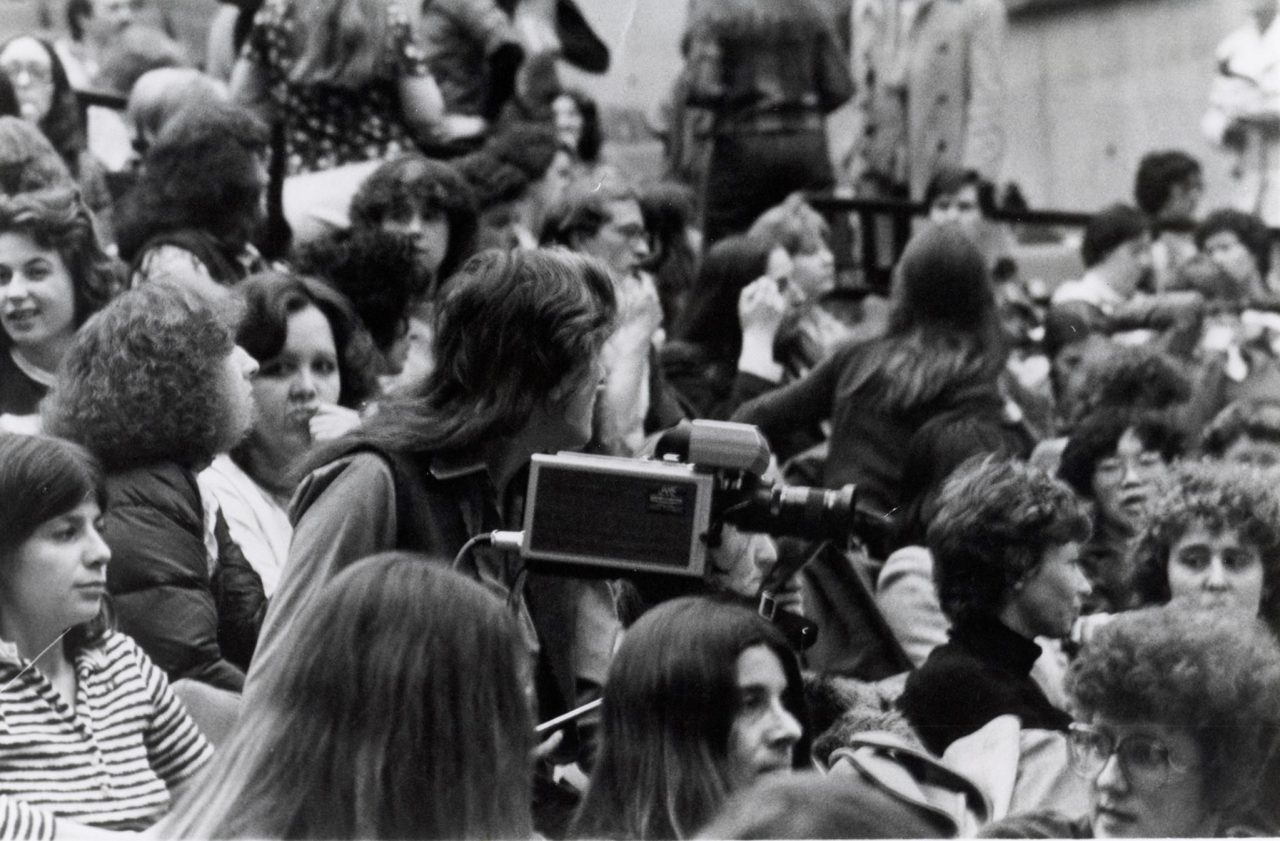
The second in an ongoing series of events, Reactivating: Art and Archives gathers a community of interest around the issues of art, activism and archives. Talks by Christine D'Onofrio, Amy Nugent and Becki Ross will be followed by group discussions.
[more] -
Event
22 Mar 2017, from 7-8:30 pm
Panel: Archives LIVE! Reactivating: Art and Archives
The third in an ongoing series of forums, Reactivating: Art and Archives gathers a community of interest around the issues of art, activism and archives. A collaboration with the Pleasure and Protest, Sometimes Simultaneously! free school and Western Front, this iteration takes the form of a panel discussion. Moderated by PPSS! co-founders Randy Lee Cutler and Magnolia Pauker, panelists Lorna Brown, Marcia Crosby and Kay Higgins will explore personal and professional experiences related to the broad thematic of Feminisms and Archives, promising critical and creative conversations, live. The aim of PPSS! is to engage and inspire critical praxis through reading and thinking together.
[more] -
Event
3 Nov 2018 from 1-2:30 pm
Independent Archives Week 2018. Artists Respond: Laiwan, Elizabeth MacKenzie and Cindy Mochizuki
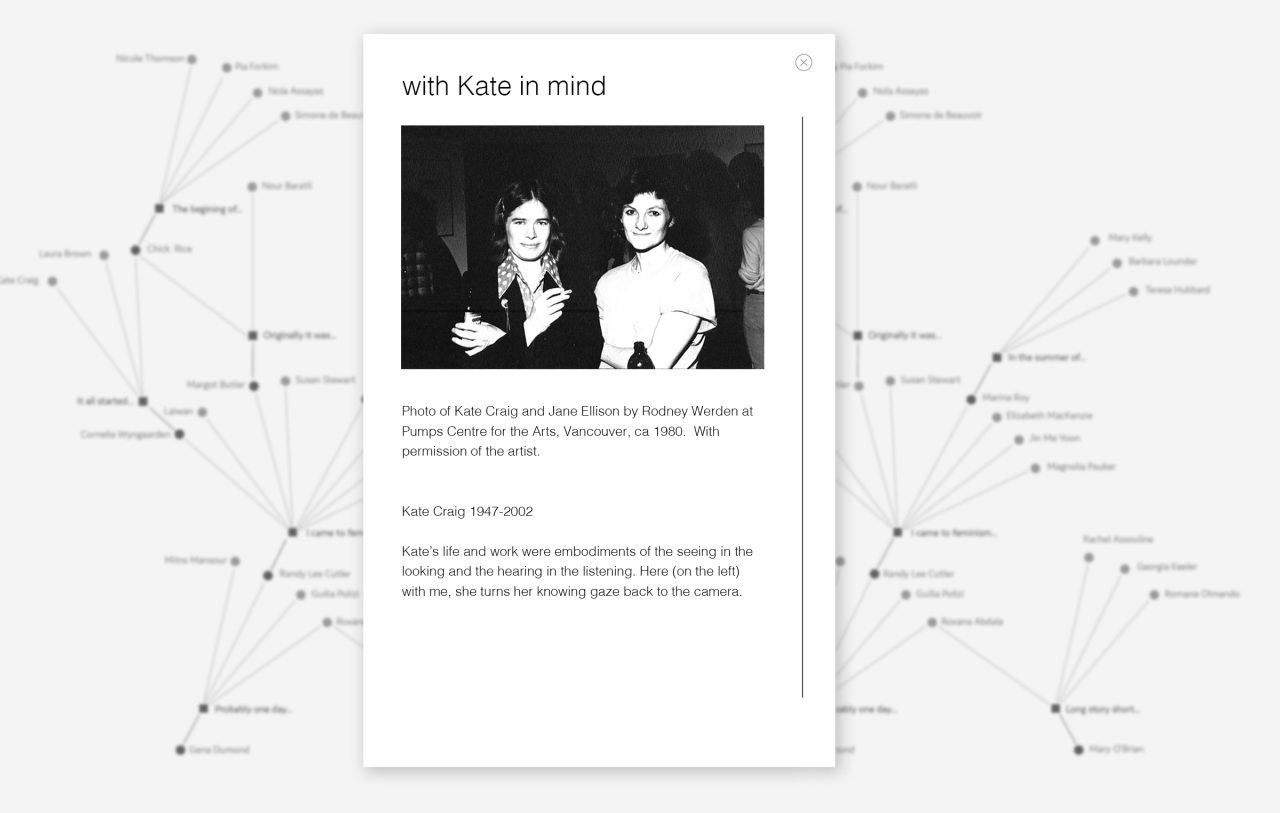
How do we respond to archives both public and private? In this come-and-go event, artists Laiwan, Elizabeth MacKenzie and Cindy Mochizuki respond to artist Christine D'Onofrio's online project, Intuition Commons and the Belkin Gallery's Archive. The activities are open for viewing, listening and conversations throughout the event. Light refreshments will be served.
[more] -
Event
18 Mar 2017, from 12-5 pm
Art+Feminism Wikipedia Edit-a-thon 2017
In collaboration with UBC Department of Art History, Visual Art and Theory Instructor Christine D’Onofrio, and concurrent with Art+Feminism events worldwide, the Belkin Art Gallery invites participants of all genders and expressions to join in a Wikipedia Edit-a-thon. Annually each March, art and feminist communities around the world converge to correct Wikipedia’s gendered biases, to bolster the representation of female-identified persons indexed within the ubiquitous online resource.
[more] -
Exhibition
4 September 2018 – 2 December 2018
Beginning with the Seventies: Collective Acts
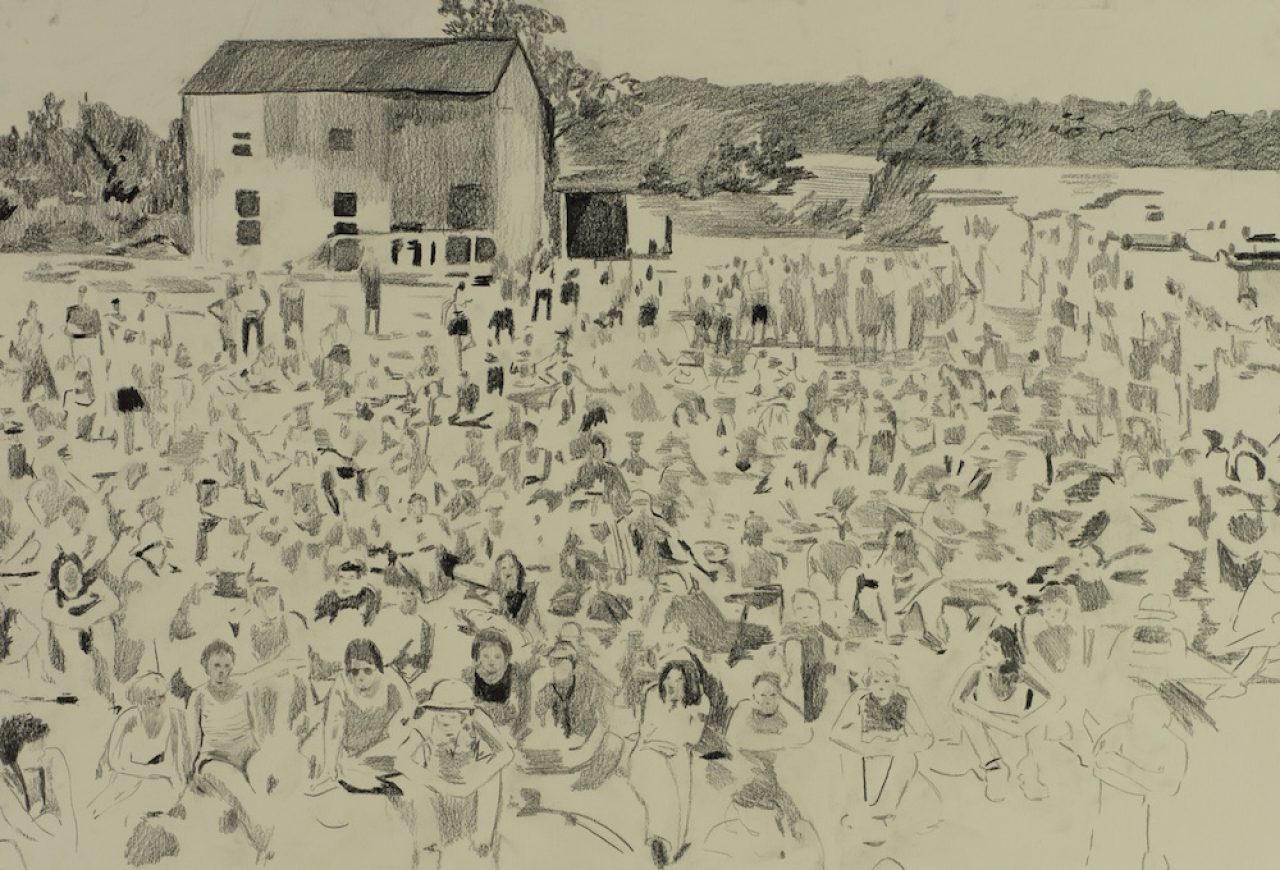
Collective Acts taps into the generative potential of archival research by artists into experiments with collective organizing and cooperative production, presenting new work by Dana Claxton, Jeneen Frei Njootli and the ReMatriate Collective, Christine D’Onofrio and Heather Kai Smith, alongside work by Salish Weavers Guild members Mary Peters, Adeline Lorenzetto and Annabel Stewart. Beginning with the Seventies: Collective Acts is curated by Lorna Brown and is the third of four exhibitions based upon the Belkin Art Gallery’s research project investigating the 1970s, an era when social movements of all kinds – feminism, environmentalism, LGBTQ rights, Indigenous rights, access to health services and housing – began to coalesce into models of self-organization that overlapped with the production of art and culture. Noting the resurgence of art practice involved with social activism and an increasing interest in the 1970s from younger producers, the Belkin has connected with diverse archives and activist networks to bring forward these histories, to commission new works of art and writing and to provide a space for discussion and debate.
[more] -
Exhibition
12 January 2018 – 8 April 2018
Beginning with the Seventies: GLUT

Celebrating the excessive abundance of the archive, Beginning with the Seventies: GLUT is concerned with language, depictions of the woman reader as an artistic genre and the potential of reading as performed resistance.
[more] -
Exhibition
22 June 2018 – 12 August 2018
Beginning with the Seventies: Radial Change
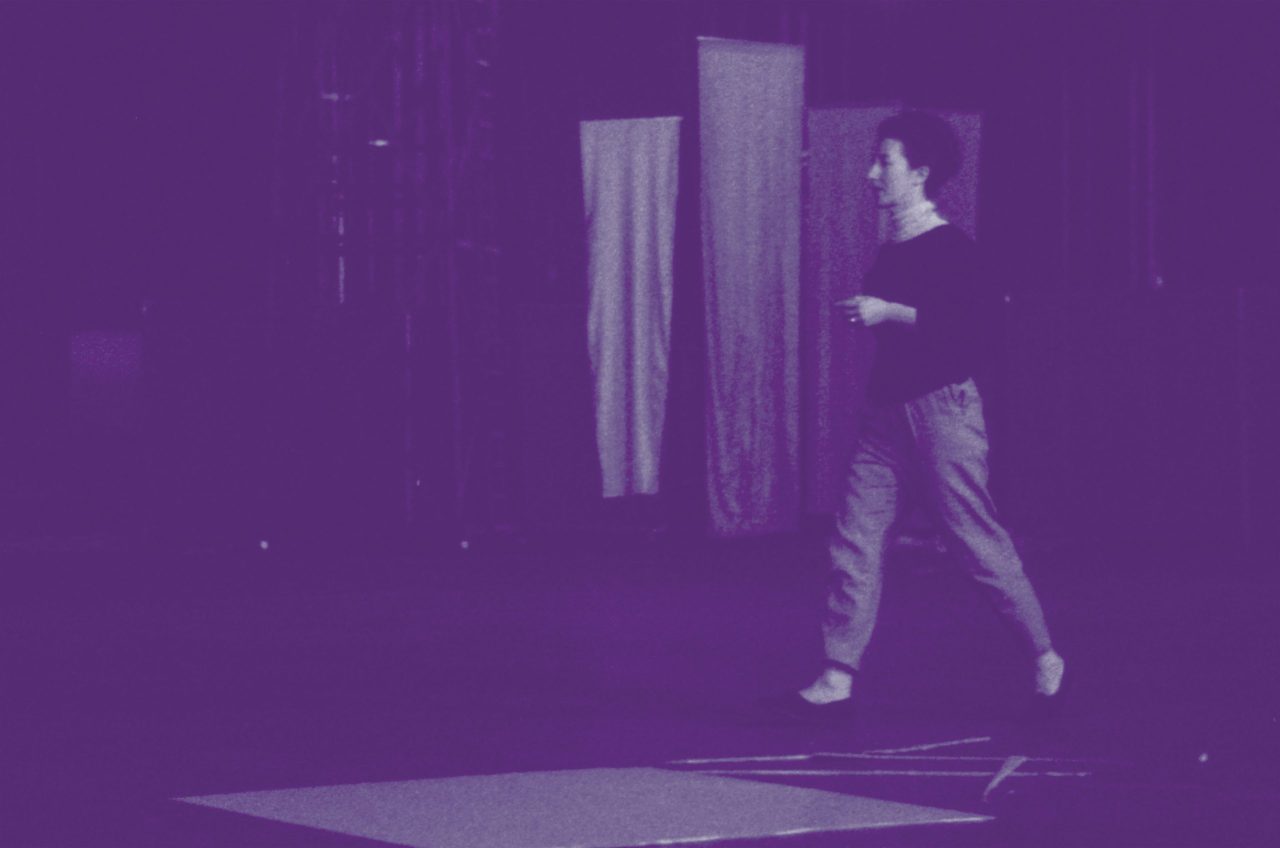
How is an archive formed? Memories of performance often exceed the containment of the document, whether photography, film, prop or testimony. As communities disperse and regroup over time, figures may slip away from the centre. Circling around the embodied archive, the exhibition Radial Change is drawn from the title of a dance work by Helen Goodwin. The elusive histories of Goodwin’s choreography and her influence on the interdisciplinary art scene of the 1970s are explored in new installation works by Evann Siebens and by Michael de Courcy.
[more] -
Exhibition
11 January 2019 – 7 April 2019
Hexsa’a̱m: To Be Here Always
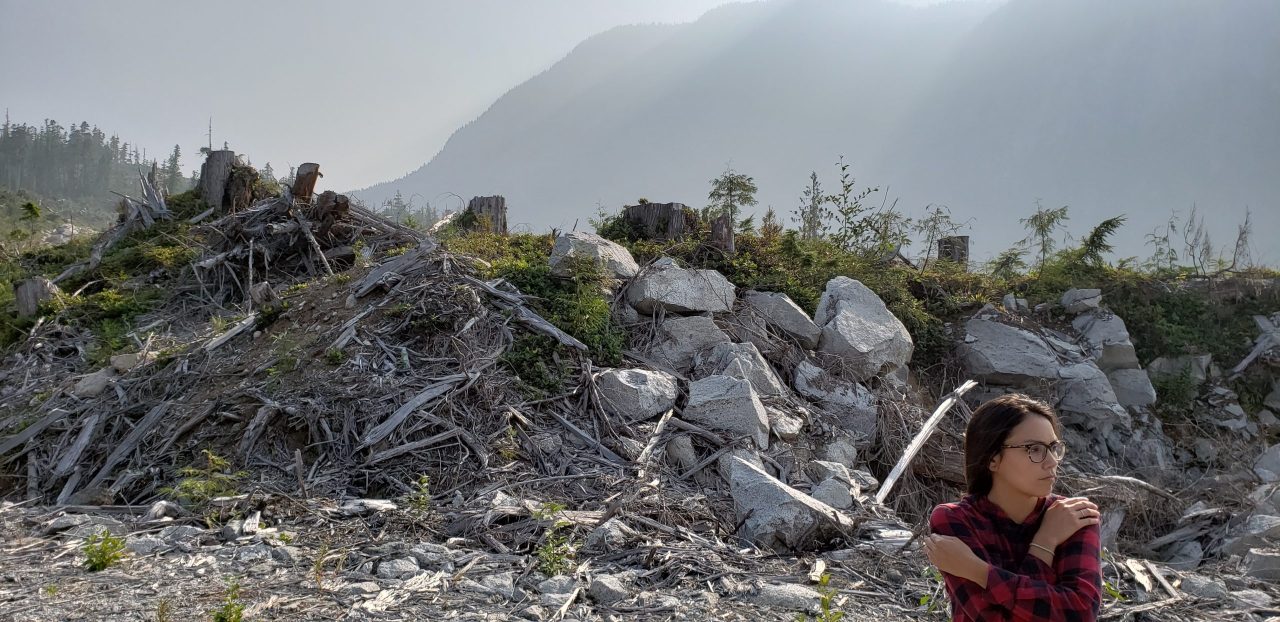
Working together at Kingcome Inlet in Summer 2018, a group of artists used film, video, social media, weaving, animation, drawing, language and song to address the urgent threats to the land and water. A manifestation of the relationships formed between the participants over this past year, Hexsa’a̱m: To Be Here Always is based on sharing knowledge and respectful collaboration. Simultaneously research, material, media, testimony and ceremony, the exhibit challenges the western concept that the power of art and culture are limited to the symbolic or metaphoric, and that the practices of First Peoples are simply part of a past heritage. As Marianne Nicolson states, “We must not seek to erase the influence of globalizing Western culture, but master its forces selectively, as part of a wider Canadian and global community, for the health of the land and the cultures it supports. The embodied practice of ceremonial knowledge relates to artistic experience – not in the aesthetic sense, but in the performative: through gestures that consolidate and enhance knowledge for positive change.” Hexsa’a̱m: To Be Here Always positions the gallery as an active location for this performance, drawing together many faculties and disciplines of the university in generative exchange.
[more]